- Home
- Lynne Olson
Those Angry Days Page 34
Those Angry Days Read online
Page 34
Willkie’s avowal of bipartisanship infuriated Republican leaders. Most prominent Republicans in Congress and the party hierarchy strongly opposed Lend-Lease, and they hoped that Willkie, as titular head of the GOP, would do the same. Nothwithstanding his defeat, he was still extremely popular with a significant segment of the American people.
But the Republicans’ desire for a solid anti-Lend-Lease front had come to naught when Willkie declared his support for the program in January. “Under such dire circumstances,” he said, “extraordinary powers must be granted to the elected executive. Democracy cannot hope to defend itself in any other way.” What’s more, he attacked those in the GOP who opposed Lend-Lease, asserting that “if the Republican party allows itself to be presented to the American people as the isolationist party, it will never again gain control of the American government.”
Making matters still worse, as the Republican old guard saw it, Willkie announced that he was going to Britain, as Roosevelt’s personal representative, to see for himself how that beleaguered country was faring. Rep. Joseph Martin, whom Willkie had appointed head of the Republican National Committee, begged him not to go. “Roosevelt is just trying to win you over,” he argued, pointing out that “this won’t be well received by Republicans.”
That was putting it mildly. Willkie was immediately denounced as a turncoat and traitor by members of his party; Robert McCormick called him the “Republican Quisling.” Roy Howard, the isolationist publisher of the Scripps-Howard newspaper chain, invited Willkie to dinner to tell him that “all the time and effort I have spent on helping you has been wasted” and that his newspapers were now going to “tear your reputation to shreds.” Willkie later told friends he managed to keep his temper during this diatribe, “though if Howard wasn’t such a little pipsqueak, I’d have felt like knocking him down.”
According to the columnist Raymond Clapper, most of the GOP’s most influential members were “conspiring to get rid of [Willkie]. They hate him more than they hate Mr. Roosevelt.” One of them, former RNC chairman John Hamilton, snapped: “Out of the 190-odd Republican members of the House and Senate, Willkie couldn’t dig up ten friends if his life depended on it.”
On January 19, 1941, the night before FDR’s third-term inauguration, the president met with the man who, three months before, had been his bitter foe and was now his most important foreign policy ally. While Roosevelt “took an immediate liking to Willkie,” in the words of Labor Secretary Frances Perkins, the former Republican nominee apparently didn’t return the favor. Although the meeting was cordial, Willkie failed to succumb to Roosevelt’s fabled charm, according to the Christian Science Monitor columnist Roscoe Drummond. The Republican’s “incalculable services to the government,” Drummond observed, were performed out of a sense of duty rather than any feeling of kinship with the president.
Other occupants of the White House apparently were as interested in Willkie as FDR was. In her memoirs, Eleanor Roosevelt recalled that members of Roosevelt’s professional and household staffs were so anxious to catch a glimpse of Willkie that they pretended to have errands taking them into the room where he waited for the president. She added, “I would have gone myself” if other urgent tasks hadn’t prevented it.
Willkie’s warmth and magnetism had much the same effect on the British people. He made a whirlwind tour of the country in the last week of January, buying a round of drinks and playing darts at a London pub, clambering through the ruins of bombed-out buildings, dropping in on an aircraft factory, and visiting underground shelters during Luftwaffe raids. When Churchill discovered that Willkie had been striding around London without a steel helmet, he immediately sent the former presidential candidate six helmets and three gas masks. British newspapers waxed rhapsodic about his visit; one glowing editorial bore the headline VENI, VIDI, WILLKIE.
Americans were also avidly following Willkie’s mission to Britain; according to one Washington columnist, his tour had “been more stirring to national interest than any journey ever taken by another American in public life.” In early February, with the Lend-Lease debate nearing its climax and its outcome still uncertain, the administration was in urgent need of Willkie’s star power. Secretary of State Cordell Hull sent him a cable asking him to cut his trip short and return to Washington to appear before the Senate Foreign Relations Committee.
Agreeing, Willkie arrived in Washington just hours before he was scheduled to testify. While clearly exhausted from his strenuous travels, he was ebullient and forceful in his assurances to the committee that Lend-Lease offered “the last best chance for us to avoid war” and that Britain would stand “firm and strong” against Hitler as long as it received the aid promised under the legislation. “The people of Britain are united almost beyond belief,” he added. “Millions of them will die before they give up that island.”
The isolationists on the Senate Foreign Relations Committee pelted Willkie with hostile questions. One senator grilled him about his campaign accusation that the president was secretly planning to dispatch American boys to war. Shifting uncomfortably in his chair and running his fingers through his hair, Willkie finally said with a sheepish grin: “I struggled as hard as I could to defeat Franklin Roosevelt. And I tried not to pull my punches. But he was elected president. And he is my president now.”
Willkie’s remarks drew loud applause and cheers, as well as a spate of approving newspaper editorials, many of which endorsed Lend-Lease. “Whatever influence he has lost among professional Republicans,” wrote the Washington Post columnist Ernest Lindley, “has been more than offset by his increased prestige among those who voted against him.” The day after he testified, the Senate Foreign Relations Committee, by a vote of 15–8, voted in favor of the bill.
Although Willkie’s resolute support of the legislation had clearly influenced a number of legislators, the battle for passage in both houses of Congress was still difficult. In the House, it became clear that in order to win approval for the measure, the president would have to agree to a number of restrictive amendments, including a two-year limit to the program. Roosevelt agreed, and on February 9 the House passed the bill, 260–165.
The opponents of Lend-Lease in the Senate still hoped to stymie the measure. They thought that what had happened in the 1937 Court-packing battle might happen again: that the debate could be extended long enough to give isolationists a chance to turn public opinion against Lend-Lease. For more than two weeks, Burton Wheeler, Gerald Nye, Hiram Johnson, and a score of others rose on the Senate floor to deliver lengthy diatribes (some lasting up to nine hours) against the bill and the undeserving “British plutocrats” who they claimed would be the recipients of its largesse.
The CBS correspondent Eric Sevareid, who covered the prolonged, tedious debate, was appalled by the scene playing out before him. Three months earlier, he had been in London, dodging bombs while covering the Blitz; he knew firsthand how desperately Britain needed the aid being debated on the Senate floor. A pacifist in his college days, Sevareid had been transformed by his experiences reporting on the German aerial assault on Britain and, before that, on the fall of France. Now committed to the idea that America must “fight the war with every means available,” he was stunned that so few of his countrymen, especially in “leafy, dreaming” Washington, shared his conviction. Watching the isolationist senators ramble on, he later wrote, filled him with “physical revulsion.” He described the orators as “tobacco-chewing, gravy-stained, overstuffed gila monsters who, nestled in their bed of chins, would doze through other speeches, then haul up their torpid bodies and mouth the old, evil shibboleths about King George III, the war debts, Uncle Sap, and decadent France.” They were, he added, “very dangerous men.”
Clearly, the Roosevelt administration thought so, too. Worried that the American public might be swayed by senatorial arguments that the British were trying to fleece the United States, the White House demanded that Britain liquidate its most valuable industrial holding in Americ
a—a textile company called American Viscose—to prove that it had exhausted all financial options before receiving U.S. aid. American Viscose was sold to a group of American bankers, who promptly resold it for a much higher price.
Infuriated by what he regarded as high-handed coercion, Churchill wrote to Roosevelt, in a cable never sent, that the administration’s demands “wear the aspect of a sheriff collecting the last assets of a helpless debtor. You will not, I am sure, mind my saying that if you are not able to stand by us in all measures apart from war, we cannot guarantee to beat the Nazi tyranny and gain you the time you require for your rearmament.” To one of his cabinet ministers, the prime minister raged: “As far as I can make out, we are not only to be skinned but flayed to the bone.” (Henry Stimson agreed with Churchill, writing in his diary, “We were not paying the money to Great Britain because we were investing but … to secure a certain military advantage which she gave us by keeping up her defense.”)
In retrospect, it is doubtful that the forced sale of American Viscose had much of an impact on American public opinion, which, throughout congressional consideration of Lend-Lease, never wavered in its strong support of the measure. The Senate isolationists never received the break they were hoping for, and their colleagues, along with an increasingly large segment of the American people, began to show their displeasure at the opponents’ delaying tactics. Groans, hoots, and shouts of “Vote! Vote!” were now heard on the Senate floor every time one of the bill’s foes stood up to speak. After the White House agreed to yet more amendments, a weary Senate on March 8 finally approved the legislation, by a vote of 60 to 31.
Despite the compromises, the passage of Lend-Lease was considered, quite rightly, to be an enormous triumph for Roosevelt; indeed, it was one of the greatest successes of his presidency. He not only devised this revolutionary plan, which would end up playing a crucial role in the Allies’ ultimate victory, but also conducted a brilliant campaign to sell it to the public.
Yet Lord Lothian and Wendell Willkie deserve much credit as well. If not for the British ambassador’s pressure, it’s uncertain that the president would have come up with Lend-Lease when he did. And Willkie’s backing, as demonstrated in his congressional testimony, played a major role in guaranteeing the public’s support of the program, as well as the votes of many members of Congress, both Democrats and Republicans.
Roosevelt, for his part, was well aware of how much he owed his former opponent. When Harry Hopkins, in the presence of the president and Robert Sherwood, made a wisecrack about Willkie later in the war, FDR “slapped him with as sharp a reproof as I ever heard him utter,” Sherwood wrote. He quoted Roosevelt as saying to Hopkins: “Don’t ever say anything like that around here again. Don’t even think it. You of all people ought to know that we might not have had Lend-Lease or Selective Service or a lot of other things if it hadn’t been for Wendell Willkie. He was a godsend to this country when we needed him most.”
THE PRESIDENT’S SIGNING OF the Lend-Lease measure marked an extraordinary shift in America’s role in the war, as well as in its ties to Britain. A stroke of a pen had erased all pretense of U.S. neutrality; there was no question that America was now an ally of Britain, albeit a noncombatant ally. The two countries were linked in an unprecedented economic relationship, requiring them to work together to plan and implement defense production and allocations of matériel. In a very real sense, the “special relationship” had begun.
Uncomfortably aware of how much the landscape had changed, some isolationists began to rethink their position. Among them was Senator Arthur Vandenberg, a Republican from Michigan, who wrote in his diary: “We have taken the first step upon a course from which we can never hereafter retreat.… We have said to Britain, ‘We will see you through to victory’—and it would be unbelievably dishonorable for us to stop short of full participation in the war if that be necessary.” Although Vandenberg had fought Lend-Lease “from start to finish,” as he told a friend, he decided he must now support the program: “It is now the law of the land [and] we have no alternative except to go along.”
Sharing that view was Kingman Brewster, who had testified against Lend-Lease before the Senate Foreign Relations Committee. Immediately after passage of the legislation, however, Brewster resigned from America First. Explaining his reasoning to Robert Stuart, he wrote: “Whether we like it or not, America has decided what its ends are.… A national pressure group therefore is not aiming to determine policy, it is seeking to obstruct it. I cannot be a part of that effort.”
Another prominent young isolationist had also rethought his position. John F. Kennedy had come to the conclusion that Britain must be saved and that the United States must be the savior. “The danger of our not giving Britain enough aid, of not getting Congress and the country stirred up sufficiently … is to me just as great as the danger of our getting into war now,” he wrote. “We should see that our immediate menace is that England may fall … America must get going.”
In Chicago, one of America First’s most prominent members—Sterling Morton—posed several questions to his colleagues on the group’s national committee: With national policy now set, was it possible for loyal Americans to continue to oppose their government? Wasn’t it time to swallow all misgivings and close ranks behind the president?
America First’s chairman, Robert Wood, answered Morton’s questions with an unequivocal no. Wood, who himself was under increasing pressure from Sears, Roebuck to resign from America First, wrote his troubled friend: “True, in a sense we are in the war now, but there is a vast difference in the position of being a friendly nonbelligerent and in the position of an active belligerent.” America First had suffered a devastating defeat, Wood acknowledged, but it had not yet lost the war over intervention. The organization would fight on.
IN THE MIDST OF this angst and rejoicing over Lend-Lease, little attention was paid to the fact that America had an agonizingly long way to go before it could actually become the “arsenal of democracy.” As General Friedrich von Boetticher noted in a cable to Berlin, American industry was not prepared to meet British needs and would not be for many months to come. U.S. officials “want to arouse the impression in the world that American aid will immediately begin with the greatest impetus,” von Boetticher wrote. “With this propaganda measure they conceal the simple fact that the United States is today not yet capable of giving help that could decisively influence the course of the war.”
In Britain, Winston Churchill was plagued by similar thoughts. To members of Parliament, Churchill praised Lend-Lease, calling it “the most unsordid action in history of any nation.” Privately, though, he was not that impressed. Instead of expressing his appreciation to Roosevelt, he wrote a sharp note to the president questioning details of the plan and noting that it would not go into effect for several months. Appalled by the toughness of Churchill’s draft, the British embassy in Washington urged him to tone it down and to offer unequivocal thanks for the new offer of aid. The prime minister reluctantly agreed to an expression of gratitude but retained his skepticism and anxiety. “Remember, Mr. President,” he wrote, “we do not know what you have in mind, or exactly what the United States is going to do, and we are fighting for our lives.”
Had Churchill known about the inertia that would settle over Washington as soon as Lend-Lease became law, he might have sent the cable as originally worded.
* In December 1945, Lord Lothian’s ashes were transported to Scotland aboard an American warship.
† The Almanac Singers, an antiwar folksinging group whose members included Pete Seeger and Woody Guthrie, introduced a song called “Plow Under” soon after Wheeler made his remark. It began:
Instead of hogs it’s men today
Plow the fourth one under.
‡ In response to the mothers’ organizations “who are giving Congress the idea that all women are against war and help to Britain,” the Century Group formed its own women’s unit. Called the Women’s Committee for
Action, the group organized informal networks of women throughout the country to put pressure on members of Congress and rally public opinion.
CHAPTER 19
“A RACE AGAINST TIME”
Four days after signing Lend-Lease into law, Franklin Roosevelt went before the White House Correspondents Association to declare, “Our democracy has gone into action.… Every plane, every instrument of war that we can spare now, we will send overseas.” Those listening to him were struck by the president’s fervor and sense of urgency as he underscored the vital importance of this new effort to save Britain and help defeat Hitler. “Here in Washington,” he continued, “we are thinking in terms of speed, and speed now. And I hope that that watchword—‘speed, and speed now’—will find its way into every home in the nation.”
Roosevelt’s energy and combativeness that night reminded some in the audience of a warrior donning his armor for battle. To Raymond Clapper, FDR’s address “was a fighting speech without the troops, a speech that a President might make after war had been declared.”
But then … nothing happened. As was true following a number of other rousing speeches by Roosevelt, little was done afterward to transform his rhetoric into reality. Despite the president’s optimistic prediction, neither Washington nor the rest of the country had yet discovered the virtue of speed. There were delays at every turn—snags in setting up the agency implementing Lend-Lease, holdups in producing planes, tanks, ships, and other matériel. While war-related production was indeed on the rise, it was infinitesimal compared to the massive combined needs of the British and American military. To meet those needs, new defense plants had to be built immediately, the labor force greatly expanded, and ways found to resolve the problem of critical shortages of certain raw materials.

 Madame Fourcade's Secret War
Madame Fourcade's Secret War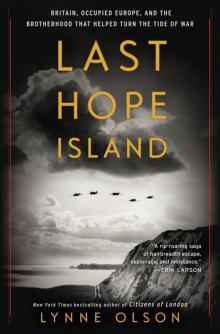 Last Hope Island
Last Hope Island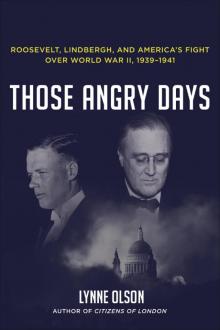 Those Angry Days
Those Angry Days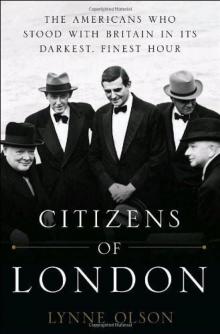 Citizens of London
Citizens of London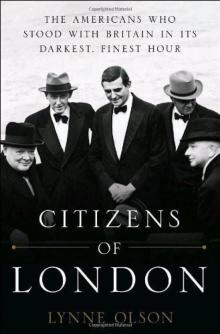 Citizens of London: The Americans Who Stood With Britain in Its Darkest, Finest Hour
Citizens of London: The Americans Who Stood With Britain in Its Darkest, Finest Hour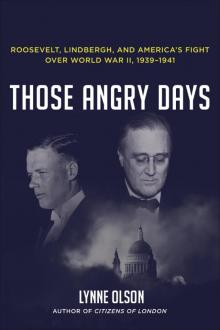 Those Angry Days: Roosevelt, Lindbergh, and America's Fight Over World War II, 1939-1941
Those Angry Days: Roosevelt, Lindbergh, and America's Fight Over World War II, 1939-1941